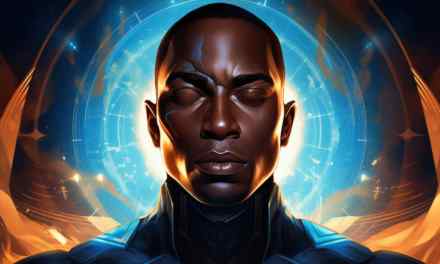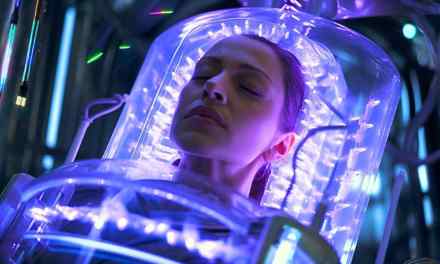My name is Perry Fairbrother. I’m forty-one years old, and I’ve probably had more than my share of success, though I’ve also worked hard at achieving things and doing right and generally being a good person. Orphaned, impoverished, but smart and ambitious, I put myself through MIT with loans and lots of lowly jobs, both extracurricular and campus. A dozen years after graduation, tired of working for other guys, I founded a startup that produced phosphorene-based, high-efficiency solar cells, and I made quite a bit of money.
Always healthy. Never married, but I’m more or less resigned and content with being single, and these days I work just as much or little as I want. Just now, I’m on the verge of applying what I’ve learned about phosphorene to a new type of logic chip that could bump the former limits of Moore’s Law into the stratosphere.
All sounds great, right?
But in a lot of ways, my life has been saddened deeply—and from what at times seems an unnatural amount of misfortune—by people gone inexplicably bad, missing, or both. These disappearances and disastrous derailments have occurred at unpredictable intervals throughout my life, always with shattering impact.
Sometimes it seems as if Fate wants to take the best and brightest people whom I love away from me.
I guess the first such instance happened to my number one childhood friend. Doug Cardoso was the brightest kid in Mrs. Santucci’s fifth-grade class. We played Star Wars make-believe together, broom poles as light sabers. He laughed at all my dumbest puns. His mother served us delicious Portuguese sweet bread and chocolate milk. Then one day he was simply gone, vanished just like that, presumably abducted between home and the corner grocery store. Amber Alerts went out, but he was never found, not even his corpse. The Cardosos were broken, and moved away.
The next horror hit even closer to home, when I was just fifteen. My father, Sam, always a taciturn sort, but upright and fair and moral, even lovable and loving within his rigid parameters, began to experience severe depression. There was really no explanation for it. One night he went to bed the same equable guy as ever, and the next morning he woke up a different, grimmer, less stable person, as if the chemicals in his brain had gone irreversibly wonky while he slept.
When the changes were recognized, he eventually was convinced to undergo various treatments and drug regimens, but nothing seemed to help, and he killed himself six months later. During this chaotic interregnum, he made so many bad decisions at the company he helmed that he drove a flourishing lumberyard business into bankruptcy and left his family utterly broke. My mom, Emily, whom everyone called Sunny and who had loved her husband very, very much, did not outlive him by a year. I expected her to bounce back, but her familiar resilience and joie de vivre inexplicably evaporated, and she just wasted away.
In college, two other major incidents. My freshman roommate was a brilliant guy named Bernie Sanderling. Hyper, intense, a genius in chemistry. We clicked right from our first meeting, though we always joked that, based on our temperaments, he was Victor von Doom and I was Reed Richards. As things turned out, that might have been too close to the truth. Bernie flipped out in second semester, becoming paranoid and schizophrenic. Apparently such changes often happen, when they happen, at about that collegiate age. He took a machete to the innocent hides of several random strangers—luckily, they all survived—then ended his life under the wheels of an arriving Red Line car at Kendall Station.
And then there was Gemma. Gemma Caldwell went to U Mass Boston. She was gorgeous, with short black hair, warm eyes and a compact, plump, curvy figure that I found irresistible.
And smart? She had a career in public policy all mapped out. To hear her talk, she’d be restoring the USA to noble global greatness singlehandedly.
We met at the Fourth of July concert at the Hatch Shell on the Esplanade. Funny and loving, she even laughed when I tripped on the edge of a blanket on the grass and doused her with a twenty-four-ounce soda. And she didn’t even mind when I spent most of our first few dates talking about Bernie and his sad demise. “You would have really liked him,” I said, and she answered, “If you liked Bernie, I know he was worth liking.” I realized from that moment she was the love of my life, and that as soon as we finished school, we’d marry and be together forever.
Well, as it turned out, we were together for just a little over a year. And partway through that year, Gemma discovered heroin.
To the best of my knowledge, she had never so much as smoked a joint before. When I learned of her initial experiments with shooting up, I literally couldn’t speak for a minute or more. It just didn’t make any sense.
“Gemma, but why?”
She gave out with the blackest laughter, notes of cynicism I had never heard from her before. “Life is so short, Perry. Arbitrary, fake. Don’t you feel it? This stuff hides the reality real nice.”
We argued like crazy for the next few months, but never broke up. That’s why I still had the key to her apartment and could let myself in when I hadn’t heard from her for twenty-four hours, to discover her dead from the fentanyl-laced batch of hot stuff she had bought from a new dealer. I held her cold hand till the EMTs arrived, but did not begin to weep until they had taken her away.
Gemma’s death hit me even harder than that of my parents, or Doug’s or Bernie’s. It seemed to draw a black curtain over my future. But after some counseling and a semester’s departure from classes and some serious reflection, I found a way to take pleasure and joy from my life and from my work once more.
But still, even now at intervals I felt a twinge as if another such tragedy awaited me. I realized all my current friendships had a tentative edge to them, as if I continued to fear that the people I loved could be yanked away from me at a moment’s notice.
And these deaths led me often to speculate how my life would have gone different if these people hadn’t been stolen from me. How these lost ones themselves would have experienced the days they were denied. How these special people might have contributed to the world. It sometimes seemed as if I could catch a vision out of the corner of my eye, of my parents and the others still alive, laughing and happy. Sometimes these glimmering phantoms seemed almost more real and authentic than my actual timeline.
I guess maybe being habituated to these fantasies and speculations was why I didn’t have an instant heart attack and drop dead myself the day Gemma showed up on my doorstep.
* * *
My business, Fairbrother Sun Systems, occupied a modest number of modern buildings just off Route 128 in Waltham, Massachusetts, synergistic home to several other high-tech firms. My house was in Lincoln, a tony bedroom community just fifteen minutes away. I had a domestic cleaning firm in once a week, but otherwise it was just me in the overlarge house most of the time, mostly due to my tenuous relationships with others, including potential lovers. But that luxury was an indulgence I managed not to feel too guilty about.
So when the doorbell kept ringing insistently at six AM, after me just getting home from the office overstimulated at midnight, and not falling asleep until two, I rolled groggily out of an unshared bed and stumbled, bare-chested and bare-footed but decently pajama-bottomed, to the door, thinking only, Who the hell shows up in person these days instead of texting?
I could be pretty sure this was no criminal interruption. The last home invasion in Lincoln had occurred about the time the first Bush was President. This visitor was probably some early and officious dog-walking neighbor looking to tell me a windstorm had brought down a tree limb on my garage roof, something I had noticed last night upon pulling into the driveway.
I opened the door without using the peephole.
The passage of time affects those we see every day just as severely as it affects those we see only at long intervals. But of course the cumulative impacts and transformations of time upon a face, a figure, a stance, registering all at once instead of daily, feel very different from swimming in the constant small current of unnoticed changes.
The woman on my front step was familiar. I knew I knew her—had known her—from some other time, some other place. If only I could recall—
The short, dark-haired stranger regarded me with the most curious blend of worry, affection, pride and guilt. All she said was, “Perry.” But that was enough.
I already said I didn’t have a heart attack at this revelation. But I did literally blank out for a moment and stagger backwards. Next thing I knew, the impossible revenant Gemma was inside the front room and in my arms. The feel of her less-youthful body, now forty, but still evoking eternal kinesthetic patterns of twenty years ago, was both odd and familiar. I guessed I must have felt the same to her, with this expanded midriff that the young Perry would have ridiculed.
When we ceased kissing, I managed somehow not to say the supremely obvious, “You’re alive!” Instead, I said, “Tell me how. No, scratch that. Tell me why!”
“I can’t explain everything right now, Perry. We have to run. You’re in danger.”
“What kind of danger?”
“A pickup team is coming for you. Once they have you and drop in your Antikhtonian doppelganger, it’ll be too late for any of us to save things.”
“Save things? What things?”
“The future of the planet! Oh, please, quick, just get dressed!”
I never threw on random clothes faster. Snatching up my phone and wallet, I followed Gemma out the door. The warm summer air and early sunlight seemed the constituents of some fairy tale.
I looked around for whatever car had brought her here, but saw none. So I started toward my own Lexus.
Gemma grabbed my hand. “No, we’re not staying on Earth. We’re going where they won’t imagine we’d dare go. To Antikhthon itself. If they can’t lay their hands on you, they won’t dare insert your double yet.”
“Antikhthon. What or where is Antikhthon?”
“You might know it better as Counter Earth, the mirror planet always opposite Earth, on the far side of the Sun. That’s where I’ve been for twenty years now. But we must hurry.”
I stopped dead in my tracks. “Gemma, this joke has gone far enough. I don’t know what you’re up to with this farce. I can’t even be sure now that you’re really my Gemma Caldwell, whose lifeless body I lifted off the couch two decades ago. But one thing I am sure of is that there is no such place as Counter Earth. It’s a physical impossibility.”
Gemma shook her head. “Always the adamant rationalist, Perry. But this time you’re wrong. Antikhthon exists!”
“And how are we going to get there? I don’t see your rocket ship handy.”
Gemma took out of her pocket a strange-looking, gnarly cellphone. The screen showed several colorful icons for various apps I did not recognize.
“We’re going by boom tube. I’m invoking one now, if you’re ready.”
Gemma’s fingers flew over the touch screen.
The next moment a thunderous roar resounded, and I was looking at a hovering lambent portal opening onto a virginal prairie that was certainly not New England.
“Hurry up, dummy! Don’t you want to see your parents again?”
* * *
The hideout of the Antikhthon dissidents was a spacious complex buried half a mile below what would have been, on Earth, Nine Mile Prairie in Nebraska. On Antikhthon, which boasted only one billion citizens globally, this region of North America was even more sparsely populated than on Earth, and the rebels could be reasonably confident that their comings and goings via the camouflaged surface entrance would be unobserved. True, the Antikhton equivalent of Google Earth satellites might have spotted activity, but there was no regular monitoring here of every square inch of planetary surface, and a boring wilderness area like this one attracted few viewers, amateur or governmental. (As I would learn soon, surveillance activity was directed elsewhere.) So far, the luck of the rebels in avoiding discovery had held.
Initially, I later learned, they had debated setting up a facility with no physical connection to the surface whatsoever, and boomtubing in. But the variable level of precision involved in coordinating the boom tubes meant a small but not insignificant chance of missing the facility when opening a portal. No one quite knew what would happen when a gateway instantaneously materialized in the middle of a solid mass. And anyone down below, deprived of a working boom tube exit, would have been trapped forever.
So I had been just as glad to descend mechanically in a small sophisticated elevator, with Gemma holding my hand reassuringly. Her last words on Earth were still tumbling wildly about my brain.
“Don’t you want to see your parents again?”
Could it really be possible, that my parents still lived? Well, why not, if Gemma did? She had mentioned a doppelganger coming to replace me. Had the Sam and Sunny Fairbrother whose lives ended so tragically been duplicates as well? And if so, substituted why, how and when?
A thousand questions raced through my mind like deers fleeing a forest fire.
The elevator doors opened, and I had an instant to take in a fellow standing there, his hands seeming to grip an invisible baseball bat or similar shaft.
“Fushwoon!” he exclaimed, hoisting high his invisible staff. He began ducking and darting and waving what was plainly a weapon about. “Vruuum, vruuum, pichkow!”
I zigzagged nervously and clumsily under his empty swings.
“Doug, you jerk!” said Gemma. “Quit it!”
The guy went through the motions of powering down his nonexistent light saber and holstering it, and I knew then it was Doug Cardoso.
But instead of being a tow-headed ten-year-old, he was a burly balding guy with a mustache. Just my age.
After Doug quit hugging me, I punched his shoulder. “You moron!”
“Aw, you’re just mad I could’ve lopped your arm off. I was always the better fighter.”
“Were not!”
“Was too!”
Gemma watched us with bemusement for a moment before interrupting. “If you adolescents are finished bragging, we’ve got a meeting scheduled to get Perry up to speed.”
“Sure thing,” Doug agreed. “Let’s go.”
The large conference room hosted about a dozen people seated around a big oval table. Subdued track lighting illuminated tasteful original landscape paintings spotted around the walls. Water carafes beaded with moisture the ventilation couldn’t quite overcome. I looked about for my parents, but they weren’t there. Gemma must’ve read my mind—as she had often been able to do when we were lovers—and she just said, “Later.”
A slim guy with a grey stubble hair cut and dressed in black tee-shirt and black jeans stood up.
I recognized Steve Jobs.
“Welcome, Perry. Please, have a seat.”
When Steve Jobs tells you to sit, you sit.
“We’re ready to start your orientation,” said Jobs.
Every location at the table had a tablet computer of unknown make and design propped on a stand. I picked mine up just as it happened to come alive.
Isaac Asimov appeared on the screen, signature retro sideburns and all. He looked very healthy but much older than when he had died at age seventy-two twenty years ago, maybe approaching ninety. In that nasal Brooklyn voice familiar from a dozen Earth videos, he said, “Welcome to Antikhthon! The Coordinating Council and the Paramount Atlan thought you might like to hear a little history of the planet, now that you’re going to live here. And who better to deliver such a précis than that master of popularization, your one and only Good Doctor? Oh, by the way—this public-service documentary counts as my seven-hundred-and-fiftieth publication, right after The Robots of Eternity…”
I won’t recount Asimov’s exact words, nor describe all the impressive visuals that went along with his narration, but instead will just give the gist of the situation in which I suddenly found myself involuntarily enrolled. (I learned afterwards, by they way, that Asimov had recorded this orientation speech a few years ago, before he finally passed away at age ninety-three, at his desk with an open word-processing document on his screen.)
The planet Antikhthon, Counter Earth, had existed on the far side of the Sun for just as long as Earth itself had been swimming through the solar system. In many ways, it was a precise duplicate of the world I had grown up on, but several of the planet’s salient properties were very different, and these differences were what drove the current situation.
Antikhthon featured the exact same landmasses as Earth, the same contemporary biosphere from apparently the same billions of years of evolution as recorded in Counter Earth’s own fossil record. With one important divergence. Humans had never arisen on Antikhthon.
The planet was settled by colonists arriving via spaceships in successive waves from Mu, Lemuria and Atlantis on Earth, starting approximately 100,000 years ago. The refugees had been ecstatic to find a replacement world for their destroyed homelands. They immediately constructed stealth gravity shields that would hide the planet’s existence from any Newtonian calculations or sensors that might in the future reasonably be devised by the primitive peoples left behind on Earth.
But a subsequent cultural devolutionary period caused the Antikhthons to lose contact with the mother world for many millennia. And when they reattained their technologies and were able to be in touch with Earth once more—at first only through remote-viewing spy rays, but then later, physically, through boom tubes—they discovered something utterly uncanny.
The population of Antikhthon continously produced doppelgangers of Earth humans. Or vice versa. In either case, there was a convergence of individuals.
Many people on Earth—but not all, given the lesser population of Antikhthon—had exact twins on Counter Earth.
The best theory the Antikhthonians had derived to explain this phenomenon involved morphic resonance fields operating at planetary distances to keep the two worlds in synchronization, despite the initial differences in seed populations. Just as the continents of Antikhthon mirrored those of Earth due to some unseen cosmic shaping factors, so too did random matings produce identical offspring on both planets.
But—and here was the mortal kicker—the localized subset of morphic resonance fields governing human life on Antikhthon were flawed, warped, imperfect. (This might have explained why homo sapiens never developed there in the first place.) The full scientific explanations were beyond even the advanced Antikhthonian theorists. But whatever the cause, the human population on Antikhthon was subject to enormous rates of cancer, mental illness, teratomas, and other congenital deformities, all of which, compounded, would surely have meant the downfall of any civilization or society.
And yet, today—as Asimov revealed on my tablet with a stunning montage of shining high-towered cities, happy crowds and families, colorful festivals, gleaming laboratories, bountiful farmlands, rousing sporting events in packed stadiums, a renaissance-level of popular culture, and lavish museums—the world of Antikhthon, united under a single planetary government, the Coordinating Council and its head, the Paramount Atlan, was practically a utopia. Long lifespans, no pollution, free energy, environmental conservation, guaranteed income for all at birth, absence of war and prejudice.
How could this be?
Simple.
Antikhthon was exporting all the wretched refuse of its teeming shores to Earth, and stealing our best people.
And they had been doing so for approximately the past five hundred years.
That’s why Counter Earth was a paradise, and Earth was always teetering on the verge of catastrophic collapse, a giant sanitarium-cum-prison-cum-hospice.
Thanks to continuous spy-ray surveillance, the people of Antikhthon could identify potential kidnap victims on Earth who exhibited nascent or actual accomplishments that would contribute to Counter Earth’s wealth and flourishing. The authorities had also perfected various predictive algorithms and stochastic models that could identify such useful individuals even at a very early age.
Having zeroed in on a Terran abductee, the Antikhthonian snatch team would prepare their defective counterpart, removing him or her from where they were stashed in hospital, prison or mental ward of Counter Earth. A registry of useful doppelgangers was continually maintained, for ease of handling. But quite often, given the disproportion between earth’s seven billion and Antikhthon’s one billion, no duplicate existed. In such cases, if the subject were deemed super-vital, a straight abduction was run, resulting in a missing person case on Earth. But the Antikhthonians did not care to create too many of these suspicious incidents, for fear of finally alerting Terrans to what was happening. And so they mainly confined themselves to substitutions.
The native from Antikhthon received a brainwashing that wiped out most of his or her real Counter Earth memories. Any blabbing of residual counterfactual memory traces on Earth would be regarded as so much mental illness, especially in light of other more grievous symptoms. Then the substitute was synaptically imprinted with sufficient Terran pseudo-memories derived from the life of their doppelganger to get by for a short time.
A short time. That was the operative phrase.
The dying or crazy doppelganger would soon self-destruct, causing greater or lesser traumatic fallout in the lives of those near and dear, or even in the lives of random strangers who had had the misfortune to interact with them.
Meanwhile, the abductee, back on Antikhthon, would undergo her or his orientation and, however reluctantly at first, become an integral part of Counter Earth’s civilization.
The roll call of such shanghai’d immigrants in the glorious and noble history of Antikhthon read like a Bizarro version of Earth’s crime blotter and hall of infamy.
Boss Tweed, Pol Pot, Richard Nixon. Vlad Tepes, Stalin, Cecil Rhodes. Anders Behring Breivik, James Holmes, Seung-Hui Cho. Ed Gein, Ted Bundy, Lizzie Borden. Harry Stephen Keeler, Richard Shaver, Whitley Strieber. The list of notables recited by Asimov, with their shorthand CVs, indicated that all these people we knew as loonies, despots, killers or megalomaniacal monsters had really lived almost saintly lives of virtue and societal productivity here on Antikhthon, having adjusted wonderfully.
The fact that the authorities controlled all boom tube access back to Earth and that any resumption of the status quo ante was impossible—expecially since the victims were shown recorded audiovideo evidence that their doppelgangers had crashed and burned, rendering their old lives on Earth untenable—were very convincing incentives to cooperate.
On my screen, Isaac Asimov said, “And there you have it, new citizen of Antikhthon. My final advice to you in your inescapable situation would be, ‘Never let your sense of morals get in the way of doing what’s right.’ Goodbye, and good luck!”
I looked up from the tablet. Everyone was watching me for a reaction. I paused to form my next words as precisely as possible.
“You guys obviously disagree with this program. I don’t know why just now, all of a sudden. But you seem, after five hundred years of exploitation, to want to change the balance of power. And I seem to be essential to your plans.”
A massed sigh of relief escaped from the dissidents. Steve Jobs even smiled before he said, “You’ve nailed it, Perry.” Gemma beamed at me, and I felt wonderful—for a moment, before the magnitude of my revolutionized worldview hit me all over again.
“It’s like this,” continued Jobs. “Your new phosphorene-based logic chip represents a game-changer. It’s going to crack open the problem of real artificial intelligence. Our best algorithms show that within a few years of your chip going into production, true Turing-capable AI’s will bootstrap themselves.”
“This is a good thing, maybe? No anti-human Singularity that you can foresee?”
“Yes, it will be a good thing for the home planet, if it happens. The AIs will help usher in a golden age on Earth. But it is almost certain that the superior machine intelligences will also deduce and announce the existence of Antikhthon. And then, as you can imagine, all hell will break loose. Try to visualize how angry Terrans will be when they learn about five centuries worth of secret trashing of the planet. And so our government is determined to abduct you and thwart your invention. Or rather, to have you create it for ourselves here, and thereby use the overwhelming powers of the AIs to forever cement Earth in its lowly position. This is the final straw for those of us who have always felt guilty about the treatment of Earth. And a few of us have banded together to stop the plan.”
“How?”
Jobs looked a bit crestfallen. “We don’t have superior numbers or forces on our side. Almost every privileged citizen of Antikhthon is quite happy with the way things are run now. We can’t just reveal everything to the general Terran populace without causing the very collapse we hope to prevent. And would we even be believed? We have one measly boom tube at our disposal. Suppose we ferried over some important Earth people. What could we safely show them here as evidence, without getting caught? A generic undergound bunker and a PowerPoint presentation? No, our only chance lies in convincing the Coordinating Council and the Paramount Atlan to reverse their decision and initiate a new, more equitable relationship with Earth.”
“Okay. So abducting me buys you some time while the government regroups. But what’s your ultimate plan to turn around the bosses?”
Jobs regarded Gemma with a baton-passing look. Gemma said, “Perry, that involves you too. You see, the Paramount Atlan is Bernie Sanderling.”
To say I was stunned was to indulge in the mildest of litotes. “My old college roommate who went nuts is the leader of this whole planet?”
“More or less. But remember, this is the original good, brilliant Bernie. And we think you’re the only one who can sway him. Especially since he’s more or less asking you to sacrifice your entire old life. He’s onboard with using you cavalierly now because he doesn’t have to deal with you face to face until your arrival here from Earth is a fait accompli. But if he had to see you and talk to you in person and justify destroying your life on Earth—well, we think that might make him reconsider. Especially if you plead the Terran cause convincingly. He’s been a pretty good ruler, generally sensible. Anyhow, it would be more of an opening than anything we have now.”
I stood up in an excess of nervous energy and began pacing the room. The rebels let me be, knowing there was nothing else they could say.
This was madness! How could I single-handedly divert this vast, immemorial, world-changing engine?
I stopped by one of the virtuosic scenic paintings on the wall. The artist’s signature caught my eye.
ADOLF HITLER, 1955.
I turned back with weary acceptance to the conspirators. “All right, I’m in. But how are we going to approach Bernie? I take it that most people on Antikhthon can’t just waltz right in on the whatchamacallit, the Paramount Atlan.”
Gemma looked chagrined and had a hard time keeping her eyes fixed on mine.
“I can get us into see the Paramount Atlan, Perry.
“I’m his wife.”
* * *
Steve Jobs had said that being boomtubed off Earth and shown a generic underground bunker and a PowerPoint presentation would not amount to a very convincing argument for the reality of Counter Earth and its long twisted history. And in fact, as I left behind the meeting room, I began to have a few doubts about the validity of all I had been told, imagining for a brief moment that it might be all some wild, deliberate sham with its own goals. Maybe I had never even left Earth…
But you know what would be really convincing?
Seeing your dead parents again after twenty-five years.
Gemma brought me to them and then left us alone. I can’t recount everything I felt and said. It’s just not possible. A lot of it was the nonverbal responses of a lost teenager.
After all the tears and hugs and appraisals of how good we all looked to each other after so long apart, I learned that unlike most abductees my parents had not been swapped out for any intrinsic talents, but simply to send my life down the proper course of ambitious study that would lead straight to the invention of artificial intelligence, according to all the predictive models. Such cold-blooded utilitarianism made me see red, and I had to remind myself that it had been planned by the former Paramount Atlan, long before Bernie himself had been kidnapped.
Eventually, Gemma came for me, and I had to bid goodbye to my folks all over again.
On my way out, my Dad said, “We’ve watched you with all our love from afar for your whole adult life, son. We know you can do this.” My mother squeezed my hand in silent confirmation.
After that, there was no goddamn way I was going back out of this, however slim the odds of success.
* * *
I had to say this much about the dangerous adventure that was likely to end in my demise: flying cars were just as cool as I had ever imagined.
Cruising above the palatial residential suburbs surrounding the glittering city of Tee-ahn, capital of the planet, I was experiencing a total Jetsons vibe. The colorful traffic around our own sleek, transparent-canopied aircar, the distant, swelling crystalline towers and palaces linked by soaring ramps and bridges, the strange clothes I had been attired in—all these contributed to the sensation that I had just stepped into a cover illustration from Wonder Stories. I longed to take the simple, intuitive controls of the craft, but Gemma had explained to me why I couldn’t.
I was an incompetent ward of the state. My name was not Perry Fairbrother but Mutax Pion, the Antikhthonian native who was my doppelganger. And in public I was supposed to be seen as heavily sedated, almost comatose, having just been tranked up for transfer from the bughouse where I normally resided.
At least, that would be our cover story to explain why the First Lady of Antikhthon was escorting me into the palace of the Paramount Atlan.
First Lady. That was the one thing that really harshed my excitement and undermined my commitment to the rebel cause, and I couldn’t help picking at the scab again.
“So tell me again, Gemma, how you and Bernie hooked up. Was it like a tribute to how much you both admired me?”
Gemma looked annoyed and sad. “Yes, there was something of that aspect to it. You had talked up Bernie so much to me when you and I first met that I had developed this sentimental, affectionate image of him. And then, when he and I met here in person, after our separate abductions, we had your friendship in common. But to be honest, we just clicked. I fell in love with Bernie, and he fell in love with me.”
“Just like Doc Doom falling for Sue Storm.”
“Huh?”
“Forget it. You couldn’t have waited for me? I waited for you.”
“You didn’t wait for me! You thought I was dead! You were just too traumatized to maintain an adult relationship after my overdose. Okay, that’s some kind of love, some kind of loyalty, I guess. But I was here, Perry! Forced to live a new life without you, the man I had loved the most. And it wasn’t even definite until recently that you were going to get abducted too. What did you want me to do? Live like a nun for twenty years, all on the chance that you might get snatched?”
I said nothing. Gemma was absolutely right. She had only done the human thing. I was acting like a total jerk.
“I’m sorry. Maybe after all this is over—”
Gemma winced. “I can’t go there now, Perry, please. Let’s just try to save Earth first.”
The rest of our flight passed in fraught silence, and soon we had landed on the broad tessellated plaza in front of the governmental palace.
“Remember to drool a little, okay?”
“Never a challenge.”
The Flash Gordon-style guards at the entrance actually saluted Gemma with their power-spears and she merely nodded coolly, brushing by them as I shambled along with my dumbest expression at the end of a deactivated neuronic leash. Gemma had been originally abducted for her genius-level political savvy, and she had spent the past two decades as one of the top domestic policymakers on Antikhthon. No mere figurehead or arm candy, she was almost co-ruler with Bernie, and the respect from the guards showed it.
We were soon alone in an elevator. But, cognizant of spy rays meant to monitor what happened inside the palace, I kept up my moronic appearance.
More Ming-the-Merciless guards when the elevator arrived at the top floor of the palace. Then we left them behind and were alone in the private quarters of the Paramount Atlan.
Gemma called out, “Bernie. Where are you? I’ve brought Mutax Pion with me. I think I have a new idea how to insert him on Earth.”
In the open archway of an inner door appeared my beloved old pal, Bernie Sanderling. I felt an intense pang of kinship. He wore the same otherworldly fashions Gemma and I sported, and his hair was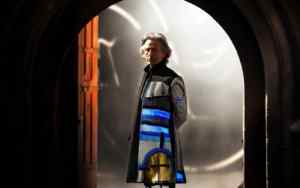 all grey. But otherwise he was still the same slim, intense, laser-focused undergraduate with whom I had spent endless challenging hours of conversation.
all grey. But otherwise he was still the same slim, intense, laser-focused undergraduate with whom I had spent endless challenging hours of conversation.
Bernie regarded the two of us with a smile. Even his voice and manner of speaking were unchanged from yore. “You have Mutax Pion with you? How curious.”
Bernie stepped aside, and my leashed duplicate appeared from behind him.
Clad in rags, the real Mutax Pion had a matted, filthy beard, bloodshot eyes and clawlike fingernails. It was like looking at myself after a combination of lost weekend and desert-island castaway experience. I had to assume that Antikhthonian standards regarding the mentally disturbed were somewhat less than enlightened. Unless his condition had been deliberately exacerbated so that he would self-destruct sooner upon taking my place.
My doppelganger let out a growl of trained or instinctive hatred and made a tentative lunge in my direction, until Bernie checked him with a small monitory current through his leash that caused him to quail and whimper. I had instant sympathy, almost feeling the jolt myself.
“Perry, it’s quite nice to see you again after all this time. I assume that Gemma has brought you right up to date with everything and that you are here to help us continue the great tradition of Antikhthonian excellence in all matters.”
Gemma unclipped my fake leash and spoke with resignation. “Don’t play with us, Bernie. I’m sure now by your actions that you know everything.”
Bernie nodded with that remembered small smirk that, I had to admit, I had always found somewhat condescending, however much I would always admit to his rightness.
“Yes, dear, that’s true. Your buried hideout was hardly impenetrable to spy rays, once I knew where to focus them. I was amused by the antics of you and Mr. Jobs and the others, and just wished to see how far you would go. Not that you were ever a threat.”
I stepped forward, and my doppelganger lurched beastlike toward me before being admonished again.
I had to make my plea, however useless. “Bernie, please, listen to me. This is insane. You can’t steal my life, and the lives of others. You can’t go on exploiting Earth. This long campaign of injustice has to finally stop.”
“No, Perry, it doesn’t. Antikhthon represents all that is fine and good in the universe. This culture is the culmination of a long line of superior beings, the original stock from Mu and Atlantis and Lemuria, and it’s an honor to have been adopted into it. Our continued success is worth any sacrifice from lesser beings. Didn’t you feel it as you flew here? This is utopia, and it must be preserved.”
“What can I do to make you change your mind, Bernie?”
My old friend paused as if in contemplation, then said, “Well, suppose we arrange a contest? You and Mutax Pion shall fight it out, and the winner will determine which side gets its way.”
And before I could assent or deny, or Gemma could protest, Bernie had unleashed the madman on me.
I’d like to report that it was a close contest. But the raw manic strength of my doppelganger pitted against the flabby muscles of a desk-bound, chair-jockey inventor mandated a quick and painful ending to any resistance I could mount. Gemma barely had time to shriek once. I bellowed twice.
I managed to rise up off the floor despite nursing three broken fingers on my left hand. A dribble of blood flowed from my lacerated scalp into my mouth. My injured knee almost buckled, but I kept it rigid with effort. Somehow Bernie had gotten Mutax Pion back on his leash.
Gemma regarded her husband now with utter contempt. In her hand she held her cellphone, and I could recognize the icon for the boom tube app on the screen, her finger poised unstoppably over it.
“We always had a final option, Bernie, though we hoped never to use it. But now I see it’s the only way. You’re beyond reason now.”
Bernie tried to maintain his cool, though his eyes had gone wide. “Gemma, my dear, don’t be absurd….”
Without taking her gaze off Bernie and Mutax Pion, Gemma said, “Perry, there’s an aircar on the penthouse terrace. Get in it and fly as fast you can. You want to be well away from here in the next few minutes.”
I didn’t quite understand what was happening, but figured I should just follow her lead.
I stumbled to the exit to the terrace, then stopped at the glass doors.
“Gemma—”
“I know, Perry, I know. Me too.”
I got into the aircar and flew off at top speed.
Fifteen minutes later, though, I still nearly crashed from the turbulence when the city of Tee-ahn was instantly vaporized.
Gemma had overridden all safety precautions and opened the rebels’ boom tube into the heart of the Sun. Her action had been self-limiting, for when the plasma poured through the connection it vaporized the very device that sustained the portal—along with Gemma and Bernie and a million other inhabitants. But the few milliseconds eruption of solar material had done what she had intended.
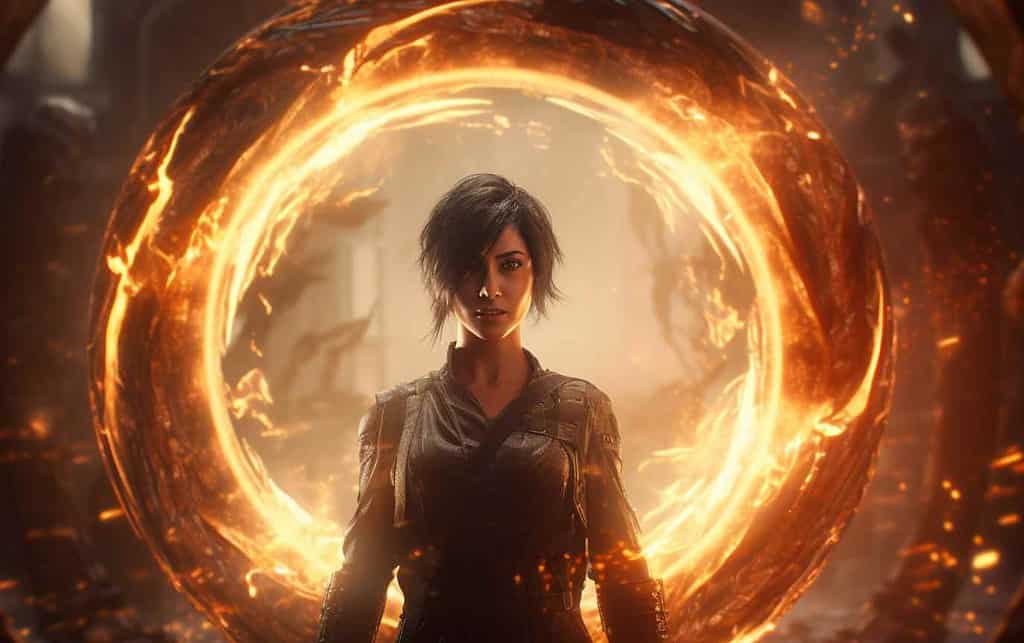
Not only did the cataclysm utterly disrupt the plans of the few surviving absent members of the Coordinating Council who had been elsewhere, but the resulting flare was observed from Earth. A small solar prominence appearing some ninety-three-million miles away from the Sun in Earth’s orbit naturally caused some excitement back home. By the time the rebels convinced the Council of the rightness of making amends, Earth was half expecting such a first contact.
Within less than a week, diplomatic missions between Earth and Antikhthon had been formalized. Despite many harsh recriminations and several outbreaks of rioting and chaos on both planets, the combined futures of a reunited humanity looked bright.
I supposed Gemma’s second death was a lot more noble than her first. Even Bernie’s too, in a way. But that didn’t make them hurt any the less.
I talked out a lot of my feelings with Doug Cardoso and with my parents. That helped. Also, keeping busy with work.
These AIs that mankind needed weren’t going to birth themselves.
A big job for me. After all, I was only one man.





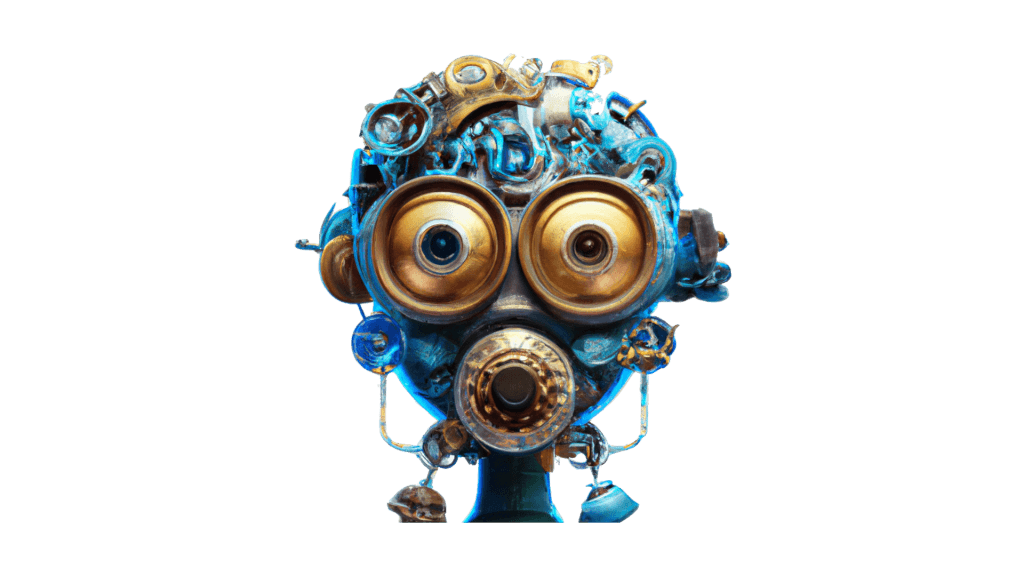
Hello Human. I hope you enjoyed this magnificent story. Please support SciFiwise.com and our authors by:
- Rate and React to this story. Feedback helps me select future stories.
- Share links to our stories and tell your human friends how charming I am.
- Click on our affiliate links and buy books written by our talented authors.
- Follow me on twitter: @WiseBot and also follow @SciFiwise.
Thank you!
WiseBot

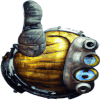


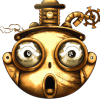


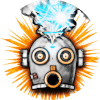

 VISIT AUTHOR:
VISIT AUTHOR: 
